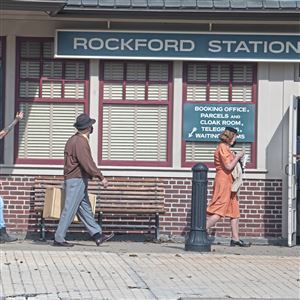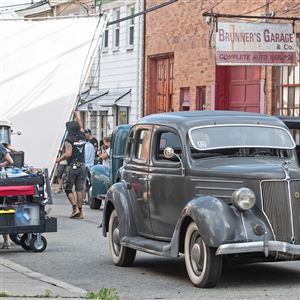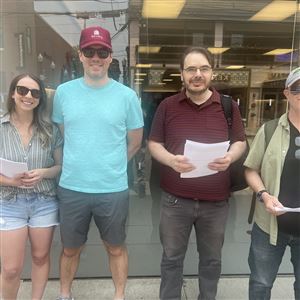This is the first in a series about how the SAG-AFTRA and WGA strikes are affecting Western Pennsylvania’s film community.
Caitlin O’Connor has no regrets about voting to authorize the SAG-AFTRA strike. After 15 years of trying to make a living in Hollywood as an actor, the 2007 Uniontown Area High School graduate is ready for a fight.
“I’m coming from the standpoint of my residual checks, which I have to live on the rest of my life,” O’Connor told the Post-Gazette. “The streaming residuals I get are pennies, whereas the network checks are quite substantial. I know I could be making so much more money if the contracts were correct.”
The vast majority of Hollywood film and television production work immediately ground to a halt throughout the country in mid-July when SAG-AFTRA joined the already raging Writers Guild of America labor dispute against the Alliance of Motion Picture and Television Producers. Each union will require its own deal, but many of their demands — increased residuals from streaming work and protections against advancements in artificial intelligence — are in lockstep.
This widespread Hollywood shutdown has resulted in no AMPTP-affiliated films or TV shows shooting in Western Pennsylvania since April 18, which is when production on season two of the Amazon Freevee drama “American Rust” officially wrapped. At this point, there’s very little work available for the hundreds of local SAG-AFTRA members in their chosen field beyond television commercials, the occasional independent project and a few other SAG-approved creative endeavors.
The Post-Gazette recently caught up with Pittsburgh’s acting community to take the region’s collective temperature on how these strikes have affected their lives and livelihoods. Here’s what we learned:
‘I’ll definitely feel it’
Patrick Jordan is a longtime Pittsburgher who has been a SAG-AFTRA member since 2004. Like O’Connor, Jordan voted in favor of a SAG-AFTRA strike despite knowing full well that meant this “giant chunk” of his annual income would dry up overnight. He at least can fall back on his primary job as the founder and artistic director of Braddock-based theater barebones productions, which is currently gearing up for its 20th season of shows.
“I’ll definitely feel it,” he said of this Hollywood drought. “As will a bunch of other people. If you’re going to live in Pittsburgh and have this kind of career path, you have to diversify. It’s still a juggling act.”
As Jordan put it, the rise of streaming services “kind of revolutionized the game and left the actors behind” in terms of the residual compensation that actors used to get through traditional re-runs and syndication. Jordan recalled once receiving a residual check from Disney with those iconic Mickey Mouse ears emblazoned on it for exactly 3 cents.
“They could have held off and just saved money for the stamp,” he quipped.
He estimated that guest spots on certain popular TV shows used to net actors up to $20,000 in residuals over the course of a few years — not enough to solely support them, but a significant contribution to their bank accounts. That could disappear completely, though, if the AMPTP pushes through its reported proposal that would allow studios to scan background actors’ faces via AI technology and use their images in perpetuity while only paying them for one day of work.
Jordan fully supports these strike efforts and believes that “no one’s asking for anything that’s out of the ordinary.”
“The actors and writers aren’t asking for huge amounts of money here,” he said. “We’re talking about small percentages. ... This is just what’s fair.”
Tearing down the wall
Sé Marie Volk is a 34-year-old Jefferson Hills native who splits her time between acting gigs in Pittsburgh and Los Angeles. She has been a SAG-AFTRA member since 2013 and has personally experienced what it’s like to sign away her image and likeness for a specific project, watch it blow up and only receive a small fraction of the payout she could have been getting under a more mutually beneficial collective bargaining agreement.
“We’ve been exhausted for a long time,” Volk said. “To work your ass off day in and day out and essentially be told you’re not even worth it is making a lot of performers reevaluate things, the business model itself, and who they may be interested in working with or not in the future.”
It’s not uncommon for Volk and the fellow actors in her inner circle to text each other photos of their residual checks as a joke “because there usually isn’t anything in front of the decimal point.” She said that “you would make more [money] watching your neighbor’s cat” than what most background actors are usually compensated for a single day of work.
The concept of a “feast year” where actors are able to sustain themselves on three or four projects is pretty much gone now, according to Volk. These days, Volk doesn’t think that level of employment would even allow a middle-class actor to earn the $26,470 a year from working on union productions required by the SAG-AFTRA Health Plan. If AI scanning became the norm, it would be virtually impossible for many SAG-AFTRA members to maintain their health coverage.
Volk has been teaching youth acting classes and taking on some non-entertainment jobs to get by during this work stoppage. She is hoping that when the dust settles, SAG-AFTRA will have negotiated a new contract in which all performers are compensated in accordance with a film or TV show’s success.
“I don’t think there’s any differentiating factors between working in Pittsburgh and Los Angeles in terms of what we’re asking,” Volk said. “What we’re asking for is basic needs as working performers and employees of any industry. ... [W]e’re hitting a brick wall here, and we just have to keep hitting it until that wall crumbles.”
Splitting up the pie
When Cotter Smith first got to Pittsburgh in 2016 for a role in the Netflix series “Mindhunter,” he had no intentions of staying here. He never left, and now the 74-year-old veteran actor lives in Highland Park and has remained busy working in both the Steel City’s theater scene and on Hollywood productions filming in the area. For someone who has rarely struggled to book acting jobs, it has been “very strange” for Smith to be facing at least a summer with no cameras rolling.
”It's impacting so many people beyond the optics of what the general public is aware of,” he said. “The dominos are falling, and the people who depend on this industry are unable to make a living. ... It’s really upsetting.”
Smith is a SAG-AFTRA member and “completely supportive” of what SAG-AFTRA and the WGA are trying to accomplish. He appreciates the many notable celebrities who have made appearances on picket lines in New York and Los Angeles over the last two weeks to ensure everyone knows that “this is about our industry,” not just making the already wealthy even richer.
These strikes have reminded Smith of COVID-induced production shutdowns in 2020, particularly in the way both events left many actors scrambling to keep their health insurance. Smith said that his health coverage lapsed for the time in 30 years during that time, making him one of the many older actors negatively affected by the SAG-AFTRA Health Plan’s pandemic-era decision to temporarily stop counting residuals toward its earnings threshold.
For now, Smith is keeping himself afloat through local theater work, private acting lessons, and teaching engagements through Point Park University and Carnegie Mellon University. He’s most concerned at this juncture with “the tenor of the conversation” coming from main figures in this conflict on both sides, including Disney CEO Bob Iger and SAG-AFTRA president Fran Drescher.
“We don’t exist without each other,” he said of SAG-AFTRA and the AMPTP. “At some point, we have to stop being mad and get serious about solving the problem. It’s solvable. It’s just about how to split up the pie.”
‘A necessary evil’
In 2005, Amy Lyn Elliott found herself in need of some extra dough to pay for her oldest child’s college room and board. The 49-year-old Vandergrift resident and University of Pittsburgh finance administrator decided to supplement her income by picking up voice-over work and background acting gigs on films, shows, commercials and more. She’s now a SAG-AFTRA member and is also represented by locally based talent agency The Talent Group.
Before COVID, Elliott would regularly spend most of her weekends working on at least one film or show shooting in this region.
“We were actually getting pretty excited because things were starting to stabilize post-COVID,” she said. “Now, this is another indefinite situation. We don’t know how long this is going to last and when these negotiations are actually going to be resolved, and how soon after it’s resolved production will pick back up again.”
Elliott sees both strikes as “a necessary evil” to ensure all actors are compensated fairly and safeguarded from having their images co-opted against their will. The AMPTP’s alleged AI proposal “would completely gut the industry,” according to Elliott. She likened that use of AI to “Joan is Awful,” a season-six episode of the Netflix anthology series “Black Mirror” about a woman whose life has been turned into a prestige streaming drama starring a deep-faked Salma Hayek.
“This is what we’re afraid of!” Elliott said. “And it’s insane that Netflix was the one to put it out.”
It’s an odd time to be a Hollywood background player, and all Elliott can do is keep the faith that her union settles this strike “without having to concede too much.”
“That’s the scary thing: Not being at the table, you don’t know what’s being discussed,” she said. “But I feel like our leadership is great and will come up with the resolution that will be the most beneficial to us.”
Next: How other locally based SAG-AFTRA members are affected by that union’s national strike.
Joshua Axelrod: jaxelrod@post-gazette.com and Twitter @jaxelburgh.
First Published: July 25, 2023, 9:30 a.m.
Updated: July 25, 2023, 3:19 p.m.





























